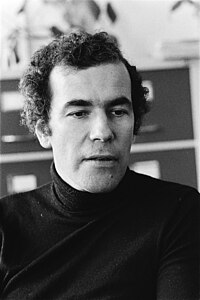|
Dick Swaab
Dick Frans Swaab (born 17 December 1944) is a Dutch physician and neurobiologist (brain researcher).[1] He is a professor of neurobiology at the University of Amsterdam and was until 2005 Director of the Netherlands Institute for Brain Research (Nederlands Instituut voor Hersenonderzoek) of the Royal Netherlands Academy of Arts and Sciences (Koninklijke Nederlandse Akademie van Wetenschappen).[2] LifeSwaab graduated at the Amsterdams Lyceum in 1963. He received his doctorate of medicine at the University of Amsterdam in 1968, and his Ph.D. in 1970 with professor J. Ariëns Kappers on a neuroendocrine thesis, and in 1972 he received his medical degree. He was from 1978 the director of the Netherlands Institute for Brain Research.[3] In 1979 he was appointed professor of neurobiology at the University of Amsterdam. In 1985 he founded the Nederlandse Hersenbank—known in English as The Netherlands Brain Bank[4]—to facilitate international research on brain diseases.[5] Swaab is an atheist.[6] ResearchSwaab is best known for his research and discoveries in the field of brain anatomy and physiology, in particular the impact that various hormonal and biochemical factors in the womb have on brain development.[3][7] Another area of Swaab's work, which has drawn much attention, is his research on how sexual dimorphism relates to brain anatomy, as well as research relating to sexual orientation and transsexuality. Through his years of research, Swaab, according to his own words, came to the deterministic and materialistic conclusion that brains are not things we have, but rather brains are what we are: the physical and chemical processes in our brains determine how we react and who we are.[citation needed] Currently, Swaab is most active in the field of depression and Alzheimer's research.[8] Swaab's research has on several occasions produced controversy. After conducting research suggesting links between brain anatomy and sexual orientation, Swaab reports receiving death threats from individuals believing this work was attempting to 'pathologize' homosexuality and treat it as a biological abnormality or disorder.[9][10] Swaab's view that neither free will nor metaphysical entities such as souls or spirits exist has also caused negative reactions among various religious groups.[11][12] Swaab consistently defends his studies in the face of such criticism.[13] RecognitionSwaab has numerous scientific awards and was mentor of 84 Ph.D. students, 16 of whom became full professor. He is editor of several journals about brain research.[14] Swaab has an H-index of 135 as of 2023, having been cited over 34,000 times.[15] He is a member, honorary member, and founder of many scientific and professional associations. He was the second person to be awarded the Emil Kraepelin Guest Professorship at the Max Planck Institute of Psychiatry, Munich, Germany, in 1996, and is a visiting professor in three locations in China, and at Stanford University, United States.[16] He also is appointed Chao Kuang Piu Professor at Zhejiang University, Hangzhou, P.-R. China. He has been decorated with the Knight of the Order of the Netherlands Lion,[17] a high order of chivalry of the Kingdom of the Netherlands. Education
Professional career
Workplaces
Awards and honoursSwaab has received the following awards and honours:[14]
BibliographyMonograph
Key papers and publicationsSwaab has co-written extensively on a number of topics, including sexual differentiation of the brain, Alzheimer's disease, Parkinson's disease, depression, eating disorders and metabolism, multiple sclerosis, human postmortem cell culture, Huntington's disease and hypertension.[14] References
External linksWikimedia Commons has media related to Dick Swaab. |
||||||||||||||||||||||
